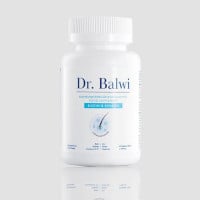
Which Vitamin Deficiency Causes Hair Loss?
Nutritional deficiencies, particularly in vitamins, can play a major role in hair thinning and shedding. Although not a vitamin, iron is a critical mineral that plays a key role in hair growth and is frequently involved in deficiency-related hair loss, particularly in women. Other vitamin shortages disrupt your hair follicles’ ability to produce healthy strands and maintain normal growth cycles. Multiple vitamin deficiencies often work together to accelerate hair loss across your scalp.
Identifying vitamin deficiency as a source of hair loss is an essential first step in preventing and treating this common condition. Early recognition of nutritional causes allows corrective action before hair loss becomes severe. Proper identification helps distinguish vitamin-related hair loss from other causes requiring different treatment approaches.
How Vitamin Deficiency Causes Hair Loss
A lack of key vitamins disrupts the normal hair growth cycle by weakening the cellular processes that support healthy follicle function. Your hair follicles require specific nutrients to produce strong keratin proteins and maintain the three-phase growth cycle of anagen, catagen, and telogen. When essential vitamins become scarce, your follicles cannot sustain normal growth patterns and begin producing thinner, weaker strands that increase shedding.
The disruption typically begins during the anagen phase, when active hair growth occurs. Vitamin-deficient follicles cannot maintain this growth period, causing hair to enter the resting telogen phase prematurely. This shortened growth cycle results in increased shedding and gradually thinning hair density across the scalp.
Even mild deficiencies can trigger noticeable hair thinning over time. Nutritional deficiencies rank among the major causes that often combine with genetic predisposition and hormonal changes to accelerate hair loss patterns. Vitamin shortages affect hair follicles directly, making your hair one of the first areas to show nutritional stress symptoms.
Specific Vitamins Linked to Hair Loss

In particular, there are certain vitamin deficiencies that have been linked to hair loss. Here are the most common:
1. Vitamin D
- Role: Regulates the hair follicle cycle, especially the initiation of the anagen (growth) phase. Hair follicles have vitamin D receptors critical for their normal function.
- Deficiency Impact: Associated with telogen effluvium and alopecia areata. Low levels may impair follicle cycling and reduce hair density.
- Common Causes: Lack of sun exposure, malabsorption, darker skin tones, autoimmune diseases.
- Supporting Evidence: A 2013 review in Skin Pharmacology and Physiology found lower vitamin D levels in patients with various types of alopecia.
2. Vitamin B7 (Biotin)
- Role: Supports keratin production, the protein that makes up hair, skin, and nails.
- Deficiency Impact: Rare, but when present can cause hair thinning, brittle hair, and alopecia. Often accompanied by dermatitis and brittle nails.
- Common Causes: Long-term antibiotic use, anticonvulsants, or inherited metabolic disorders.
- Supporting Evidence: While widely marketed for hair health, biotin deficiency is uncommon in healthy individuals; clinical benefit of supplementation without deficiency is unproven.
3. Vitamin B12
- Role: Essential for red blood cell formation and DNA synthesis, including in hair follicle matrix cells.
- Deficiency Impact: Can cause telogen effluvium due to impaired oxygen delivery to follicles.
- Common Causes: Vegan diets, pernicious anemia, malabsorption disorders (e.g., atrophic gastritis, Crohn’s disease).
- Supporting Evidence: Studies show a correlation between B12 deficiency and hair loss, though causation is harder to establish.
4. Folate (Vitamin B9)
- Role: Necessary for DNA and RNA synthesis in rapidly dividing cells like hair follicles.
- Deficiency Impact: May contribute to diffuse hair thinning and slow regrowth.
- Common Causes: Poor diet, alcoholism, malabsorptive conditions.
- Supporting Evidence: Frequently assessed in patients with unexplained diffuse hair loss alongside B12 and iron.
5. Vitamin A
- Role: Regulates cell growth and sebum production, which keeps the scalp and hair moisturized.
- Deficiency Impact: Rarely causes hair loss in developed countries. More often, excess vitamin A (from supplements or medications like isotretinoin) is linked to hair shedding.
- Common Causes: Overuse of supplements, high-dose retinoids.
- Supporting Evidence: Chronic hypervitaminosis A is a known cause of telogen effluvium.
6. Vitamin C
- Role: Important for collagen synthesis and enhances non-heme iron absorption from plant-based foods.
- Deficiency Impact: Indirect effect on hair health; may contribute to iron-deficiency-related hair loss. Severe deficiency (scurvy) may cause hair abnormalities.
- Common Causes: Poor diet, smoking, alcohol abuse.
- Supporting Evidence: Often addressed in conjunction with iron therapy for hair loss management.
7. Vitamin E
- Role: Antioxidant that protects hair follicle cells from oxidative stress.
- Deficiency Impact: Rare, but may play a role in scalp health and hair quality.
- Common Causes: Low-fat diets, conditions that impact fat absorption.
- Supporting Evidence: Some studies suggest improvements in hair growth in people with oxidative stress-related hair disorders, but more robust data is needed.
Signs You May Have a Hair Loss Vitamin Deficiency
Vitamin deficiencies often produce symptoms beyond hair loss that signal broader nutritional imbalances affecting the entire body. When vitamin levels become insufficient for proper nail and hair growth, brittle nails that break easily or develop ridges frequently accompany hair thinning. Fatigue and low energy levels throughout the day can indicate vitamin deficiencies that impact hair follicle function and normal growth cycles.
Dry skin, particularly on your scalp, face, and hands, often accompanies vitamin deficiencies, contributing to hair loss problems. Your skin and hair share similar nutritional requirements, making skin changes reliable indicators of potential hair-affecting deficiencies. These symptoms typically develop gradually over weeks or months as vitamin stores become depleted throughout your body.
Changes in your hair texture, such as increased brittleness or dullness, can indicate developing vitamin deficiencies before significant hair loss becomes visible. Your hair often shows nutritional stress through subtle changes in appearance and strength that precede more obvious thinning. Multiple symptoms suggest more severe deficiencies that require immediate attention and evaluation.
Seek blood work and professional evaluation when you notice multiple symptoms occurring together over several weeks or months. Your healthcare provider can test vitamin levels through comprehensive blood panels to identify specific deficiencies contributing to your symptoms. Early detection and treatment of vitamin deficiencies can prevent progressive hair loss and restore standard hair growth patterns when addressed promptly.
What Are the Treatment Options for Severe Vitamin Deficiency Hair Loss?
Dietary changes form the foundation for treating hair loss caused by vitamin deficiencies. These changes address the nutritional gaps contributing to hair thinning. Your healthcare provider can recommend specific foods rich in deficient vitamins, such as leafy greens for folate, fish for vitamin D, and lean meats for iron and B-complex vitamins. Targeted dietary modifications often show improvements in hair growth when combined with other treatment approaches and consistent nutritional support.
Supplements provide concentrated doses of specific vitamins to correct severe deficiencies more rapidly than dietary changes alone. Your doctor may prescribe targeted vitamin formulations based on your blood test results and deficiency severity. Professional therapies include specialized scalp treatments and medical interventions that support follicle health during recovery.
Hair transplant procedures may be considered in cases of permanent hair loss due to scarring or unmasked pattern hair loss, but they are typically not first-line treatments for nutrition-related shedding. Before and after patient transformations demonstrate how patients achieve natural-looking results through procedures using thousands of individual grafts to restore full density.
When hair fails to naturally recover after correcting deficiencies through consistent treatment protocols, your doctor may recommend a hair transplant. Your specialist will evaluate whether nutritional therapy has maximized natural regrowth potential before considering surgical options. Understanding treatment costs and expectations becomes essential before proceeding, as comprehensive all-inclusive packages provide transparent pricing with accommodation, transfers, and aftercare included for optimal results.
Prevention Tips for Vitamin Deficiency and Hair Loss
Maintaining a balanced diet rich in vitamins provides the foundation for preventing hair loss caused by nutritional deficiencies. Include diverse protein sources, leafy greens, fruits, and whole grains daily to ensure adequate vitamin and mineral intake for healthy hair growth. Routine health screenings help detect vitamin deficiencies before they impact your hair growth, allowing for early intervention through dietary adjustments or targeted supplementation when needed.
Managing stress through regular exercise, adequate sleep, and relaxation techniques prevents stress-related health issues that can contribute to hair loss patterns. Your body functions optimally when stress levels remain controlled, supporting better nutrient absorption and overall hair follicle health. Consistent stress management practices create an environment where your hair can maintain its natural growth cycles without disruption from physical or emotional stressors.
Overall, wellness plays a key role in supporting healthy, strong hair growth by helping your body sustain optimal nutrient levels across all systems. When you prioritize comprehensive health through balanced nutrition, regular medical care, and stress reduction, your hair benefits from improved circulation and nutrient delivery. These preventive measures work together to create the ideal conditions for maintaining thick, healthy hair throughout your lifetime.


